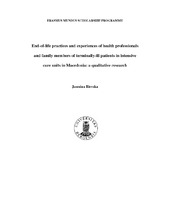End-of-life practices and experiences of health professionals and family members of terminally-ill patients in intensive care units in Macedonia: a qualitative research
Master thesis
Permanent lenke
https://hdl.handle.net/1956/8170Utgivelsesdato
2010-08-27Metadata
Vis full innførselSamlinger
Sammendrag
Objective To understand the end-of-life phenomenon in the intensive care setting in Macedonia through the experiences of health professionals and family members of terminally-ill patients in its social and cultural context. Methods Participant observation in surgical intensive care units and in-depth interviews with health professionals who had professional experience with terminally-ill patient(s) and family members of terminally-ill patients who died or had any limitation of life-sustaining medical intervention are principal methods. Results The context analysis revealed opportunity for integration of palliative care in the intensive care units as an alternative to separate palliative care services in the country. The study reveals surgical intensive care units and emergency departments and the professionals providing service to be involved in the treatment of terminally-ill patients. Both withholding and withdrawal of treatment in terminal patients are accepted practices in terminal patients. Social, cultural, economic factors influence the decision making process. Families and patients are rarely involved in the decision making process, especially in emergency cases. Communication is reported as a point to improvement from both sub- samples. Disclosing diagnosis and prognosis, as well as informed consent to treatment, though legally secured, undergo cultural reshape. Conclusion How terminally-ill patients are managed in the intensive care setting in Macedonia is shaped through the interplay of professional, cultural, ethical and social factors. The identified factors represent potential threats and opportunities to profile palliative care programs in the intensive care setting. Limitation of life-sustaining measures in terminally-ill patients is accepted among the medical professionals as an alternative to redundant prolongation of life and time of death. Patient and family inclusion in decision- making and communication is insufficient. Ethical principle of autonomy should be shaped in the cultural context. Public, ethical, professional and legal consensus is needed to improve current practice. Though this research pioneers in the understanding of the end-of-life phenomenon and identified its components and their interaction in the context, more research is needed to describe the role and needs of the patients in terminal condition and their families and decision-making surrogates.
